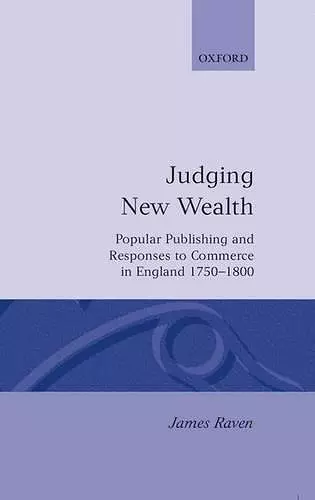Judging New Wealth
Popular Publishing and Responses to Commerce in England, 1750-1800
Format:Hardback
Publisher:Oxford University Press
Published:23rd Apr '92
Currently unavailable, and unfortunately no date known when it will be back

In this broad-ranging study, James Raven explores popular literature and the book trade in the second half of the eighteenth century. Based on intensive research into the production and sale of literature ranging from novels and magazines to courtesy books and fashionable tracts, the book examines the representation of the newly wealthy. Dr Raven challenges the notion that prejudice against the businessman was a late nineteenth-century phenomenon. He shows how, during a period of often bewildering change and instability, a competitive literature industry led reaction against excessive consumer spending, contributed to the definition of legitimate economic behaviour, and stimulated unprecedented attacks upon the social presumption of tradesmen. This is a scholarly and stimulating study which makes important contributions to debates on the supposed decline of the British industrial spirit and on the growing self-confidence of the middle class. Judging New Wealth adds very greatly to our understanding of late eighteenth-century England and its cultural and business climate.
Raven makes an interesting case, clearly supported with a wealth of evidence. * Times Higher Education Supplement *
Subtle and intelligent * Giles Mandelbrote, Printing Historical Society Bulletin, Winter 92 *
a subtle and persuasive study of the formation of cultural practices out of changing material conditions ... a tour de force of the new cultural history (of the material sort) and a model for historians trying to understand the relationships between publishing, culture, and society * Ronald J. Zboray, Georgia State University, The Library Quarterly, April 1993 *
Raven pursues his quarry with a rigour which has been conspicuously absent from previous explorations of changing attitudes. Raven contextualises his primary concerns with great thoroughness. Indeed, his study of the book trade is an excellent piece of business history in its own right. Raven's depiction is clear, well substantiated and important. No historian wanting to understand the world of eighteenth-century business life and death can afford to ignore this book. Furthermore, this book is an important contribution to a gradually gathering body of evidence about the nature and importance of the middling sorts in eighteenth-century Britain. It touches on so many issues that it is a substantial achievement. * Julian Hoppit, University College, London, Business History, July 1993 *
important book ... By exhaustively tracking down everything published at five-year intervals through his period, Raven pursues his quarry with a rigour which has been conspicuously absent from previous explorations of changing attitudes ... Raven's depiction is clear, well substantiated and important ... No historian wanting to understand the world of eighteenth-century business life and death can afford to ignore this book. Furthermore, this book is an important contribution to a gradually gathering body of evidence about the nature and importance of the middling sorts in eighteenth-century Britain. It touches on so many issues that it is a substantial achievement. * Julian Hoppit, University College, London, Business History, Vol. 35, No. 3, July 1993 *
This is an important study of how and why tradesmen, manufacturers, and the newly wealthy came under prolific literary attack in the second half of the eighteenth century. A wide-ranging work ... Raven's book is scholarly, interesting, and in large part persuasive. * Jeremy Black, University of Durham, Notes and Queries, Vol. 40, No. 3, September 1993 *
The paradox is obvious enough; what Dr Raven has done is to provide the missing element: the part in this, and inextricably in relation to this, of the developing book trade ... both very learned ... and extremely amusing.
What the reader will find...is scholarly analysis. Raven's study is sure to be an important resource, both for its methodology and as a rich hoard of information. Scholars interested in business and econmoic history, publishing history and popular culture in the late eighteenth century england will find that the considerable intellectual assets of Judging New Wealth will genreously repay their labours. * Review of English Studies *
ISBN: 9780198202370
Dimensions: 224mm x 144mm x 26mm
Weight: 581g
340 pages